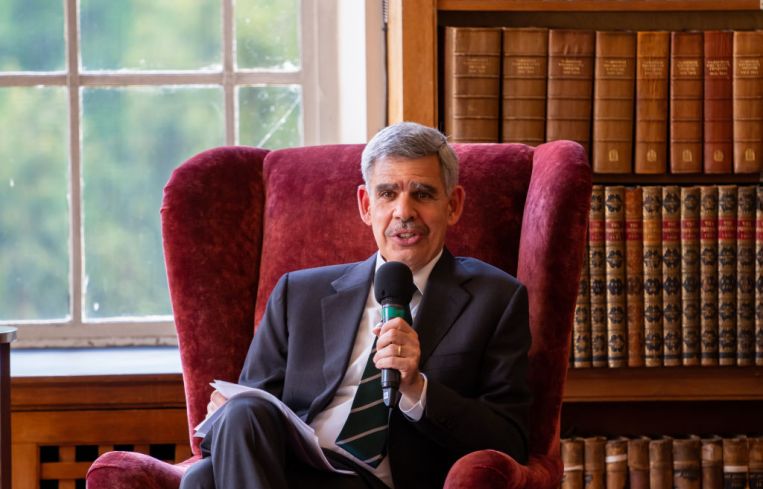MBA CREF 2024: Former PIMCO CEO Warns of the Impact of Industry Noise
By Cathy Cunningham February 12, 2024 4:51 pm
reprints
The sun was shining in San Diego as the Mortgage Bankers Association’s CREF ’24’s Monday sessions kicked off.
Attendees at the commercial real estate finance convention, descending on the Manchester Grand Hyatt hotel after a night of Super Bowl parties, discussed the not-too-interesting game that made up for it in spades in overtime — as well as Usher’s halftime performance — over coffee and pastries before taking their seats for their own Super Bowl, of kinds.
Unlike Usher’s enthusiastic proclamation of “Yeah!” in his hit song, attendees are taking an optimistic yet decidedly cautious approach to CRE in 2024.
Mohamed A. El-Erian, president of Queens College and former CEO and co-chief Investment officer of PIMCO, was the conference’s MVP on Monday, kick-starting the packed event with the (multi) billion-dollar question of “What’s Ahead in the Global Economy?”
El-Erian was interviewed by Mark Jones, the Mortgage Bankers Association’s chairman and president of Union Home Mortgage, as well as Mike Fratantoni, chief economist for the MBA.
A straight shooter, El-Erian said the biggest risk in our industry right now is the noise that exists within it.
“There’s so much noise, and people will extrapolate from the weakest point in the market, and that contaminates everything else,” he said.
While that contagion of generalization presents the biggest risk right now, the industry can fight through it with clear information, El-Erian said.
“There’s a ton of dry powder on the sideline that doesn’t want to be contaminated by contagion. It doesn’t want to get soaked by this overhanging cloud,” El-Erian said. “So, let’s not fall victim to noise.”
El-Erian was asked what worries him today in this market, having had plenty of experience transacting through other downturns and crises, including the Global Financial Crisis as CEO of PIMCO.
What’s on his mind today are three questions: Can the U.S.’s economic exceptionalism prevail — and within that, can we avoid a recession and also reach interest rate stabilization? Can we avoid contamination from geopolitical contagion? And what will happen to the existing stock (of housing, for example) that was refinanced at very artificial interest rates?
In considering those three unanswered questions and the potential ramifications of each, El-Erian said that it requires the weighing up of each scenario, and reacting accordingly — and he looked back to 2008 as an example of when the seemingly unthinkable came to fruition.
One weekend before Lehman Brothers’ collapse, the PIMCO investment committee was meeting nonstop to consider three potential outcomes for the ill-fated bank. First, the 86 percent likelihood that the bank would not fail; second, the 12 percent probability that it would but that its failure would be dealt with in an orderly fashion “as no regulators in their right mind would allow otherwise;” and third, the 3 percent likelihood that Lehman would collapse and cause a global meltdown of financial markets.
When the PIMCO team realized the third scenario was en route, they acted accordingly and established their credit default swap provisions before the wider market reacted, he said.
El-Erian didn’t hold back when it came to the Federal Reserve, caveating his comments with the disclaimer that “I’ve been accused of being too harsh on the Fed,” which was received by a laugh from the audience.
Still, he outlined a number of policy mistakes he believes the Fed has made.
First, the use of the word “transitory” in its analysis when describing the inflationary environment. Second, its lack of action when it finally retired the word “transitory” (“CPI was over 7 percent, interest rates hadn’t moved, and quantitative easing was still at play,” he said.). Third, the aggressive hiking of interest rates “wasn’t necessary.” Next up, the Fed’s lack of accountability, with El-Erian saying it “hasn’t owned up to its mistakes,” and instead hired former Fed chair Ben Bernanke to explain them. Finally, the Fed has made a number of forecasting errors, El-Erian said, describing those as a “bad series of mistakes.”
Later, El-Erian participated in 30 minutes of question and answers with attendees, answering questions, and — in a market with continued uncertainty — was surely the most popular guy at the Grand Hyatt that morning.
Cathy Cunningham can be reached at ccunningham@commercialobserver.com.

![Spanish-language social distancing safety sticker on a concrete footpath stating 'Espere aquí' [Wait here]](https://commercialobserver.com/wp-content/uploads/sites/3/2026/02/footprints-RF-GettyImages-1291244648-WEB.jpg?quality=80&w=355&h=285&crop=1)

